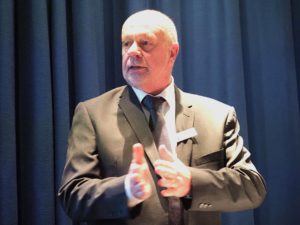UKCOA Conference 2024
The annual UKCOA Conference chose ‘Challenges and Opportunities’ as its key theme, and heard how electrification is proving to be a huge challenge – but is being tackled by ZEMO, among others. Mark Williams reports
A lively UKCOA Annual Conference held at Volvo’s Warwick headquarters saw the surprise announcment that Volvo is building an electric coach which could be launched this year.
The Conference – which was preceded by the trade association’s AGM – began with a keynote address by Domenico Bondi, MD of Volvo Bus UK and Ireland, who underlined the importance of coaches to the Sweden-based manufacturer. Domenico flagged up the 500 BZL electric buses already sold by Volvo but said that electric coaches pose new challenges.

Domenico Bondi, Volvo Bus
He underlined range, infrastructure and cost as the main barriers to longe-range battery-electric coaches, and voiced tacit criticism of the government for not including coaches in its ZEBRA grant funding rounds: “Money doesn’t come cheap, and we know it’s not easy for you,” he said, and urged the UKCOA to make itself heard in government, not only to push for funding but for coach charging infrastructure.
“You move a lot of people and have a very important role in transport, so ‘ring the bell’ in government.” When he raised the subject of alternative ‘green’ fuels such as HVO, the UKCOA President, Steve Telling, pointed out that the industry has no objection to using alternative fuels: “We can all run on biodiesel but the fact is, it’s 20% more expensive. The government doesn’t understand the coach industry.”
Domenico agreed that making HVO more affordable would be a positive move: “I know that many of you are family companies, and you are playing with your own money. In the corporate world, you play with other people’s and if you lose it, you get fired. The consequence is more serious for you and you are right to be wary of what you do with your own money.”
ZEMO pledges zero-emissions support
Claire Haigh, newly-installed Executive Director of ZEMO, echoed the sentiment that it was a mistake for coaches not to be included in England and Wales’ ZEBRA funding scheme: “Coaches have not received the attention they deserve,” she said.
“Modal shift in transport is vital if we are going to have any chance of reaching Net Zero. The planet is getting hotter but although people care about this, getting them to change is very difficult. Decarbonising the power sector is, in fact, the easy bit. Human beings are locked into unsustainable behaviour.”
Claire said that businesses need policy consistency and, although the UK was the first country in the world to commit to a legal climate change framework, transport remains the biggest business setor for emissions, and road transport now creates 90% of emissions.
She said that the fact that the green sector of the economy is the fastest growing offers hope, but that to reach Net Zero the UK needs to move from targets to delivery, and needs a ‘whole-system approach’ which may include road pricing to push behavioural change: “Winning hearts and minds is the pathway to a cleaner, safer future.”
Claire said the new Council for Net Zero Transport formed in February by ZEMO, chaired by Lord Deben, has a high-level approach which should get results. She said it’s vital that the myths which attack the credibility of zero-emissions vehicles must be addressed.
“And we need solutions that can be implemented right now. Low-carbon fuels [such as HVO] could play a role in decarbonising but we need fiscal incentives.” She said that although the UK has led the way globally with the introduction of electric buses, there is still only one electric coach brand on sale.
“I urge you to get involved. You have a passion and a commitment to this agenda. We must depoliticise Net Zero.”
Delegates including Richard Bamber of Anthony’s Travel highlighted funding for vehicles and depot infrastructure as the key challenges, one delegate saying that planning law was holding back infrastructure development, and that operators face bills as high as £250,000 to upgrade electrics to depots.
Tim Griffen, Project Manager of the Coach and Bus Working Group at ZEMO, agreed that the chief barrier to running zero-emissions coaches remains finance, pointing out that the bus industry has received almost £1bn in support for electric buses. But he said that the grid is also ‘severely restrained’ by infrastructure issues, especially in connecting sufficient power.

Tim Griffen, ZEMO
“Delays of 18 months are typical,” he said. “Depots and parking are a long way from power, and leases are not long enough.”
But Tim urged operators to be more positive when considering electric coaches: “The focus should be on what can be achieved with an electric coach, not what can’t.” He said that there is urgent need for sharing of vehicle charging, such as bus garages: “If bus and coach can share these assets, we can reduce the number of connections we need.” He highlighted FlixBus’ charging at Abellio for its new electric coach services.
Tim believes there is scope for a repower option for coaches, and the need for a repower accreditation scheme. Westway MD David West said in a later panel session that the cost of Equipmake repowering his Van Hool coaches, when complete, will be around £230,000 but would result in a vehicle with 350 miles’ range.
He also backed interim low-carbon fuels such as HVO but said the DfT are ‘not interested’ in lowering taxation on those fuels to achieve diesel cost parity. Nonetheless, the Renewable Fuels Assurance Scheme, which verifies sourcing of fuels, has approved 15 HVO suppliers, three biodiesel suppliers, ten renewable diesel suppliers, three biomethane suppliers and one hydrogen supplier.
Times of change
James Howells from Don’t Travel Empty said that the current wave of consolidation, with smaller operators being snapped up by investors and larger operations, is a feature of almost all business sectors.
“There is so much going on. There has been more change in the last two years than the previous 15 years,” he said. “And you now have new competitors such as local government, venture capital and brokerage.”
James said that acquisition should not be seen as good or bad; which depended on the circumstances. But he suggested that all operators plan ahead for change and exit strategy, with a list of options:
- Invest and continue
- Sell to a local competitors
- Sell to a large group
- Liquidate and sell your assets
- Create a ‘pension business’
- Create an MBO
- Design a management buy-in
- Or hope for the best!
James said that, in fact, there are more opportunities in the coach industry than ever before: “Businesses need coaches,” he said, flagging up growth in sales in the corporate sector.
In the forum session later, lawyer James Backhouse urged any operator considering exiting the industry to spend time ‘tarting up’ operations, especially in terms of compliance and enhancing EBITDA, eliminating complexity in the business and tying up all loose ends: “To be honest, if you’ve already lost enthusiasm for the business, it’s already too late.”
Driver academy to grow
UKCOA’s Andy Palmer said that the association’s new Driver Academy has now gone into a second round, having successfully worked with the DWP to bring in trainees from unemployment.

Andy Palmer – driver academy success
He said that eight trainees have now got their licences and are working from the initial assessment group of 30. Now, UKCOA is planning to run the same process in the Midlands.
Grant funding of £50,000 will be enough for three rounds of driver training, he said, with the funding going to the training supplier. The first round was run with the National Driving Centre in Croydon.
Andy said the scheme was dependent on recruiting from the unemployed sector but that this had yielded surprising trainees from all walks of life. The scheme also has to lead to job offers for the qualified trainees.
ABTOT bonding available
David Blake, of Tiverton-based Blakes Coaches, underlined the fact that UKCOA members can still get coach holiday bonding through ABTOT, which is sold independently of the Bonded Coach Holidays scheme which was absorbed into ABTOT.